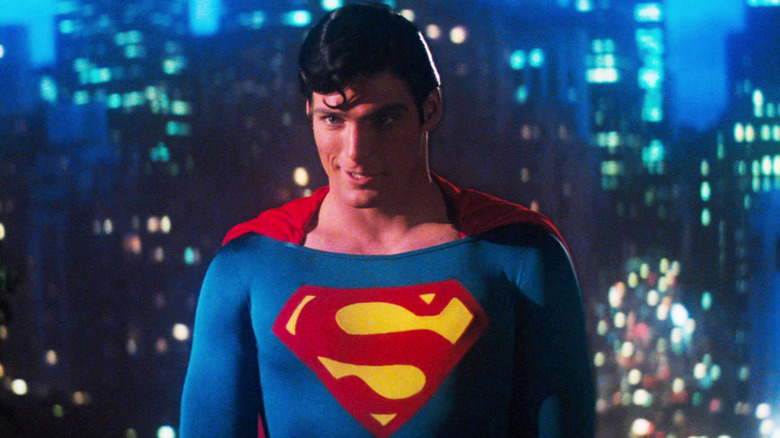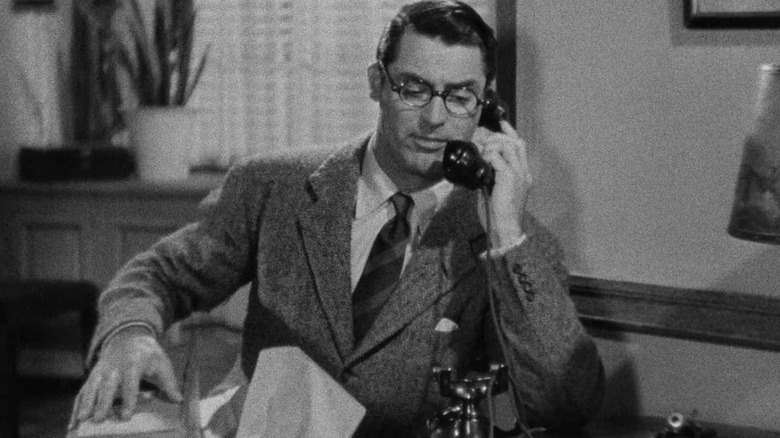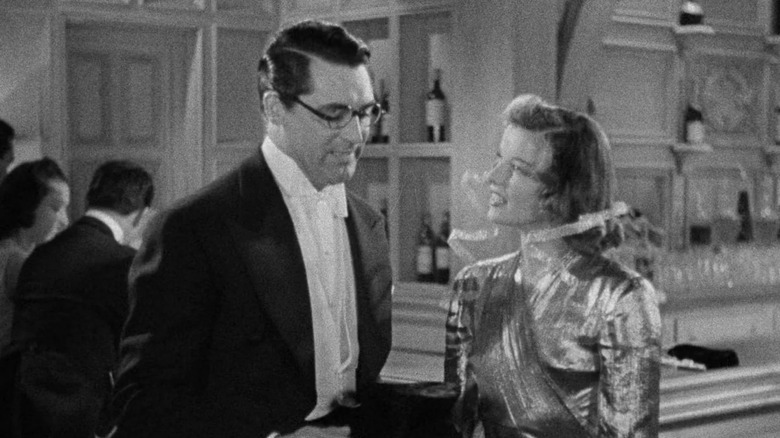The Cary Grant Movie That Helped Christopher Reeve Land His Superman Role
We may receive a commission on purchases made from links.
Christopher Reeve remains the definitive big screen Superman to this day, but his Clark Kent is just as legendary. For the Man of Steel's alter-ego, Reeve actually drew from classic Hollywood star Cary Grant's performance in 1938's "Bringing Up Baby," in which Grant clearly provides the lineaments of the diffident Clark Kent audiences came to love in the late '70s.
In 2025, James Gunn's charming crowd-pleaser "Superman" reintroduced us to the legendary hero in the form of David Corenswet's kinda goofy version of the character. The film was a hit, bringing in $615 million and becoming the biggest comic book movie of 2025 at the box office. But even with that success, "Superman" didn't feel like the kind of cultural event befitting the Man of Steel. Anybody who grew up on Reeve's portrayal of Clark Kent/Superman will know this is a character who can inspire real reverence and even awe on the big screen, a towering pop cultural icon of the 20th century who frankly deserves better than most of his recent cinematic outings. Reeve's embodiment still stands as the greatest ever portrayal of this monolithic figure.
In fairness, 1987's "Superman: The Quest for Peace" was a superhero movie so bad even its lead actor regretted making it. The previous movie wasn't all that great, either. But "Superman" and 1980's "Superman II" were pretty much perfect, and so much of that came down to Reeve's performance. It wasn't just that the man exuded exactly the kind of otherworldly self-assuredness and moral uprightness that epitomizes Superman as a character. He also made Clark Kent so charmingly awkward that it became just as foundational as the rest of his performance, and it seems Cary Grant deserves some of the credit.
Christopher Reeve played up the Superman/Clark Kent contrast
Anyone who's seen the 2024 documentary "Super/Man: The Christopher Reeve Story" will know that its subject was every bit the hero he portrayed on-screen. Most notably, after he became paralyzed from the neck down following a horse riding accident, Reeve used the rest of his life to advocate for those with disabilities and made a profound difference. But even before that, he was a hero simply for taking the character of Superman seriously. Much like Richard Donner, who knew the source material deserved the utmost respect, Reeve used his Juilliard training to bring the character of Kal-El/Clark Kent/Superman to vivid life with as much dedication as he did any character in his career.
In Reeve's memoir, "Still Me," the actor specifically talks about portraying Clark Kent and revealed that he channeled Cary Grant's character from 1938's "Bringing Up Baby" for his audition. It wasn't until Reeve had secured that audition, however, that he thought seriously about borrowing from the man born as Archibald Leach. Reeve recalled sitting on the plane to his London audition and mulling over the role. "My first insight was that the role was really two parts," he recalled. "I remembered seeing George Reeves on TV in the fifties and wondering why Lois Lane didn't instantly recognize Clark Kent as Superman. How could a thick pair of glasses substitute for a believable characterization?" This led to an epiphany for Reeve, who immediately decided to focus on creating "more of a contrast between the two characters." As Reeve wrote, "After all, Lois Lane shouldn't have to be blind or dim-witted."
Grant provided the framework for the Clark Kent side of this contrast, with Reeve highlighting "Bringing Up Baby" as being particularly instructive.
Christopher Reeve landed Superman thanks to Cary Grant and adrenaline
1938 screwball comedy "Bringing Up Baby" saw Cary Grant star opposite Katharine Hepburn (who'd infamously been labelled "box office poison" that same year) as demure paleontologist David Huxley. The scientist is forced to immerse himself in the kind of high society milieu that makes him very uncomfortable in order to secure a donation to his museum, but ends up falling for Hepburn's free-spirited Susan Vance along the way. During that process, however, there's plenty of fish-out-of-water awkwardness as Huxley tries to ingratiate himself to the rich would-be benefactors, and it's here you can most clearly see a prototype for Clark Kent. The moment in which Huxley unwittingly finds himself holding the purse of Tala Birell's Mrs. Lehman and nervously fumbles with it is pure Christopher Reeve as Clark Kent.
For Reeve himself, it was a scene in which the paleontologist perches on a ladder while working on a dinosaur skeleton that was most informative. As the actor remembered it, Grant looked "terribly awkward and afraid, while Katharine Hepburn looks brash and fearless as she comes to his rescue." He continued:
"He has a shyness, vulnerability, and a certain charming goofiness that I thought would be perfect for Clark Kent. He even wears the same kind of glasses. Of course I knew I couldn't be Cary Grant, but there was nothing to prevent me from stealing from him."
According to Reeve, by the time his plane landed, he had his performance figured out, though he was propelled through his screen test not only by Grant's example but "sheer adrenaline." As the actor remembered, "On the way back to my hotel my driver said, 'I'm not supposed to tell you this, but you've got the part.'"


